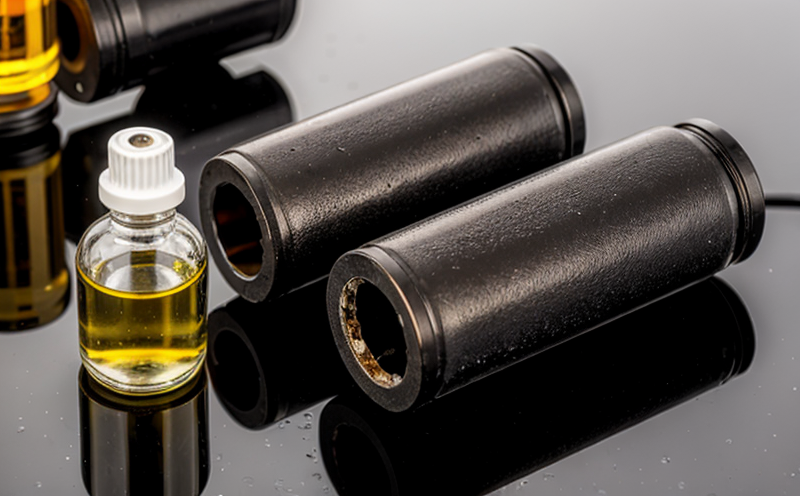ISO 9377 2 Hydrocarbon Oil Index Test in Water Validation Method Development Test
The ISO 9377-2 hydrocarbon oil index (HOI) test is a critical method for assessing the presence and concentration of hydrocarbons in water samples. This service is designed to validate new or modified methods aimed at accurately measuring HOI, ensuring compliance with international standards and regulatory requirements.
This validation process involves several key steps: selecting appropriate reference materials, preparing standard operating procedures (SOPs), calibrating instrumentation, running test samples, analyzing results, and comparing them against established acceptance criteria. The goal is to ensure that the new method provides consistent, reliable, and accurate HOI measurements under various water conditions.
The significance of this validation cannot be overstated, especially in sectors where water quality and environmental compliance are paramount. For instance, industries such as oil exploration, petrochemical processing, and wastewater treatment must adhere to stringent regulations governing hydrocarbon emissions into aquatic environments. By validating a new method using ISO 9377-2, laboratories can demonstrate that their testing processes meet these regulatory demands.
Our approach ensures robust validation by incorporating multiple checks at each stage of the process. This includes thorough calibration of all analytical instruments used in the test, rigorous quality control measures during sample preparation, and extensive data analysis post-testing. The use of certified reference materials (CRMs) helps establish a baseline for comparison against which newly developed methods can be validated.
Furthermore, this validation process goes beyond mere compliance; it also facilitates continuous improvement within laboratories. Through iterative refinements based on validation results, we help clients enhance their testing capabilities while maintaining high standards of accuracy and precision. This commitment to excellence makes our ISO 9377-2 hydrocarbon oil index test validation method development service invaluable for any organization involved in water quality monitoring or related fields.
| Step | Description |
|---|---|
| Select Reference Materials | Certified hydrocarbon standards for accurate calibration. |
| Calibrate Instruments | Ensure all analytical tools are within specified tolerances. |
| Routine Sample Preparation | Precisely prepare water samples according to ISO 9377-2 guidelines. |
| Run Tests | Conduct multiple replicates for each sample type. |
| Analyze Results | Compare measured HOI values against accepted ranges. |
| Document Findings | Compile comprehensive reports detailing validation outcomes. |
Scope and Methodology
The ISO 9377-2 hydrocarbon oil index test is a standardized procedure for determining the concentration of hydrocarbons in water samples. Our scope encompasses both routine validation exercises for existing methods as well as method development projects aimed at creating more precise and efficient testing techniques.
- Validation of Existing Methods: We verify that current practices adhere strictly to ISO 9377-2 criteria, ensuring consistent results across different laboratories.
- New Method Development: Through controlled experiments, we explore innovative approaches to hydrocarbon detection in water, focusing on enhanced sensitivity and reduced turnaround times.
The methodology employed ensures that all aspects of the validation process are conducted meticulously. From selecting appropriate reference materials to conducting rigorous statistical analyses, every step is designed to produce reliable and repeatable results. This comprehensive approach not only satisfies regulatory requirements but also fosters innovation within our clients' testing protocols.
Why Choose This Test
- Comprehensive Validation: Our service provides thorough validation of both existing and newly developed methods, ensuring reliability and accuracy in hydrocarbon measurements.
- Innovation Support: By continuously validating new techniques, we support our clients' efforts to stay at the forefront of environmental monitoring technology.
- Regulatory Compliance: Adherence to international standards guarantees that all testing meets stringent regulatory requirements, reducing the risk of non-compliance penalties.
Customer Impact and Satisfaction
- Improved Reputation: Successful validation enhances a company’s reputation for quality and reliability in environmental testing.
- Enhanced Decision-Making: Accurate hydrocarbon measurements empower better-informed decisions regarding water treatment processes and emission controls.
- Reduced Risk of Non-Compliance: Meeting regulatory standards minimizes the risk of costly fines or operational disruptions due to non-compliance.





